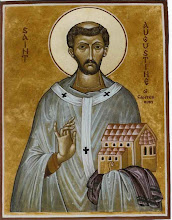This got me to thinking about the text of the Apostolic Letter which supressed the ancient order of Readers in the Roman Catholic Church, and redefined it as one of many "ministries" which may be carried out by lay people. Ministeria Quaedam:
- 2. What up to now were called minor orders are henceforth to be called ministries.
- 3. Ministries may be assigned to lay Christians; hence they are no longer to be considered as reserved to candidates for the sacrament of orders.
- 4. Two ministries, adapted to present-day needs, are to be preserved in the whole Latin Church, namely, those of reader and acolyte. The functions heretofore assigned to the subdeacon are entrusted to the reader and the acolyte...
- 5. The reader is appointed for a function proper to him, that of reading the word of God in the liturgical assembly. Accordingly, he is to proclaim the readings from sacred Scripture, except for the gospel in the Mass and other sacred celebrations; he is to recite the psalm between the readings when there is no psalmist; he is to present the intentions for the general intercessions in the absence of a deacon or cantor; he is to direct the singing and the participation by the faithful; he is to instruct the faithful for the worthy reception of the sacraments. He may also, insofar as may be necessary, take care of preparing other faithful who are appointed on a temporary basis to read the Scriptures in liturgical celebrations. That he may more fittingly and perfectly fulfill these functions, he is to meditate assiduously on sacred Scripture. Aware of the office he has undertaken, the reader is to make every effort and employ suitable means to acquire that increasingly warm and living love and knowledge of Scripture that will make him a more perfect disciple of the Lord.
In most modern Liturgies to which I've been subjected, it seems that the assumption that Readers appointed from the laity would be trained has been entirely lost. The readings from scripture at Mass or the Office have been reconceived as a valuable opportunity for "active lay involvement" in the liturgy and as such are treated as a commodity which should be gifted to an individual deemed to be in need of validation, regardless of how good they are at actually reading so as to be heard and understood. This commodification of the Sacred Liturgy as an opportunity for pushy lay people to perform is absolutely detrimental to Parish life.
Anglicans took a step in the right direction by instituting the office of Lay Reader. These individuals vest in choir dress and wear a distinctive blue scarf, and as such are clearly identifiable to the congregations they serve. They train for a number of years and receive the blessing and license of the Bishop....but why not ordination? Last time I checked they trained for three years and received weekly pastoral instruction, why are they still "Lay"?
Again, I wonder if it is slowly dawning on the Church in the 21st century that Christians in the early days actually knew what they were doing by ordaining doormen, readers, exorcists and acolytes. Our reader at the Solemn Mass described above was chosen because he could sing in tune and has no problems reading. It was not the performance of an individual, there was no hiatus while someone shuffled from a pew, trampling people en route. The reading was sung by a person able to do so, which is why we call it a Sung Mass in the first place. It was orderly and edifying and contributed to the greater act of worship that we were involved in. Do we still really think we don't need minor orders?








